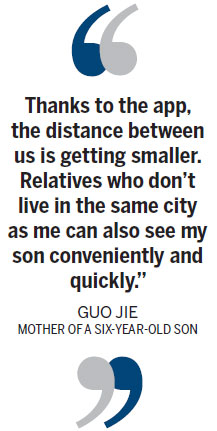Parents told to think before clicking 'send'
Updated: 2013-09-20 16:10
By Cao Yin (China Daily)
|
||||||||
Social networking sites are replacing photo albums as a method to record and share every moment of their children's lives, but some are raising concerns about privacy, Cao Yin reports.
Click, click, click...
Guo Jie took pictures with her smartphone of her 6-year-old son, who was performing on stage at a kindergarten graduation ceremony, and uploaded the photos online without hesitation.
"I want to record the growth of my child, Ke Ke, in modern ways, hoping people who love him can see his images at different times as soon as possible," said the 32-year-old from Fujian province.
She shared Ke Ke's pictures from his birth to the present on her space on instant messaging tool QQ, and on Wechat, a popular smartphone application, saying "it can be considered a task I have to do every day".
Guo is not alone.

According to a survey by a British institute, most newborns in the country can be seen within one hour of their birth.
With the boom of social network services and multi-function cameras, there are now more ways to announce a baby's birth, the survey said.
Social networking has developed so fast in the past five years that only six percent of British parents did not post their newborn's photos online, while 62 percent uploaded pictures within one hour of their babies being born, the survey said.
Even if parents don't share the pictures, their relatives do them the "favor", according to the survey.
About 61 percent of parents in the country uploaded their babies' photos three times a week, the survey added.
Now, a new word - sharent - has been coined for parents who share photos.
But network experts and some parents have also expressed concern, saying it is easier to breach privacy on websites, particularly when people surf the Internet with mobile phones.
Parents should use caution when posting family members' photos and must also be wary when using social smartphone applications, experts suggested.
A way to remember
But parents are tempted by the fast and easy tools to leave memories for themselves as well as their children.
The 32-year-old Guo said she is happy to see Ke Ke's changes every day, whether in height, weight or looks.
"I took pictures to record my child's birthdays, his funny faces or even his first teeth," she said with great pride, adding what she is doing now is like what her mother did before.
Guo's mother made a handbook with photos and text to record the young woman's growth, which Guo has always read and enjoyed.
"That's why I'm willing to do the same thing for my son, because it will bring great joy to him in the future. It's to pass on love," she said. "It must be a colorful memory, for both mom and child."
Guo is the first generation to use social networking.
More than 70 percent of her friends, some in Shanghai and some in Sichuan province, share their children's pictures on Wechat. Talking about their babies' growth has become a hot topic among these young parents.
"Thanks to the app, the distance between us is getting smaller. Relatives who don't live in the same city as me can also see my son conveniently and quickly," she said.
She could not help showing her son's pictures from badminton classes in July and excitedly told China Daily what great progress her child made in sports and communication.
He was shy, but now he can talk in an easy manner with others, no matter whether students or teachers, she said.
It will be harder to take pictures when children become older, "because they're unwilling to play with parents, especially boys," she said, adding that she takes fewer pictures of her son now than when he was a baby.
Zhu Yan, a 25-year-old mother living in Britain, echoed Guo, saying she cannot stop taking pictures when she watches her 10-month-old princess, who is half Chinese and half Hungarian.
The young mother also used the Wechat app on her smartphone to record her baby girl Xiao Yu's first moment lifting her head and her 100-day ceremony, sharing the joy with her friends in every corner of the world.
"It's amazing and interesting. I can also show what I was thinking and feeling through my baby's photos," she said.
Although Zhu's husband is sometimes worried about the app's security, she regards it as safe.
"I believe the software has been made much safer," she said, adding many of her foreign friends posted pictures as well.
The 'friend circle' feature on Wechat can provide more privacy than other social network platforms, such as Facebook and micro blogs.
Worries exist
Different from those who frequently show kids' photos online, Che Aiping uses a more conservative way to share pictures of Liu Fu, her 6-year-old son, through Wechat.
The 35-year-old mother in Beijing insists on posting pictures without her child's face shown clearly to maintain more privacy.
She would like to keep up with the multi-media age and have topics for conversation with her university dormitory mates, who have also become mothers.
"But I learned how to set up a scanning limit of the app at the beginning when I was ready to share my son's photos, and I still prefer to upload pictures of the side of his face or back," she said, adding that she became careful after hearing of a classmate's story.
Han, the surname of the classmate who has settled in the United States, often posted pictures of her 18-month-old son, but she found some people using her child's photos on other commercial websites without her permission.
"The mixed-blood boy is so cute, so a few people like taking photos of him when my classmate carries him outside," Che explained. "Maybe some of these passers-by put the child's pictures on a public website, or someone 'stole' the photos via the Internet's loopholes."
"That's the reason why I'm hesitant to expose Liu Fu," she said. "Meanwhile, I don't want my child to learn some unfriendly words someone may post below his pictures online."
In addition, how frequently parents share children's photos and what kind of pictures they select are based on what kind of a life they want to show and what personalities they have, she said.
"Many women turn to family after they marry and have babies. They spend a lot of time at home, intending to present a 'good mother' image to their friends or even the public," she said. But she is not interested about that.
"Showing my true life and thoughts with those who accompany me through life is also my aim in installing the app," she added.
Zhou Guoliang, a 35-year-old father in Tibet, agreed with Che. He thought posting daily life on the Internet sounds like something most mothers do. "Instead, a father's love is more restrained," he said.
The man, an official in a government department, was transferred to Tibet in July, when he started using Wechat to share his life.
"I just want to keep in touch with my colleagues and friends in Beijing via the app, sharing beautiful scenery and telling them my new thoughts about life," he said.
"As for what kind of a family I have and how lovely my son is, posting that is not important, because my buddies know well enough, if they are close to me," he said.
Be sensible parents
Compared with public micro blogs, Wechat seems to provide more private space for users to talk and share photos, but its security is still doubted in the technical industry.
Guan Mochen, a senior technologist with Kingsoft, a company specializing in security software, said every application has technical vulnerabilities that can be easily attacked by hackers or those who benefit from stealing smartphone users' personal information.
"Sometimes it's not a loophole in the app. Instead, it's a mobile platform with high security risks, such as Android," he explained.
More than 80 percent of the malware targets smartphones that use the Android operating system, and most were downloaded through smartphone application stores and forums, according to statistics issued in July from the National Computer Network Emergency Response Technical Team and Coordination Center.
Therefore, users must pay more attention and think twice before uploading information or photos via smartphones, no matter how safe developers say the applications are, according to Guan.
Some special groups, such as big company executives, leaders in governmental administrations and people with commercial or State secrets, must attach more importance when typing or playing on their smartphones, he said.
"Attackers, or opponents, can get more information that is not good for enterprises, or even the country, through the app users' online posts, even if it is a simple word or picture," he added.
Guo Xunping, vice-president of Bangcle, a Beijing company that provides security services for mobile devices, suggested young parents document their kids' lives in safer ways.
Wechat has improved its security and supplied restrictions on what kind of friends app users want to make, "but it's still easily attacked in a technical way," he said.
Many parents with little technological knowledge think the more restrictions an app has, the safer the information, but he said it is a misunderstanding.
In reality, the more functions or channels an app has, the more risks users face, according to him.
"What we do is add friends online with their phone numbers and think it's safe enough, but maybe their mobiles have been monitored by those with bad intentions," he said.
The technical expert, also a father, said he likes to record his daughter's growth in traditional ways, such as writing a diary.
"Different parents have different aims and habits. For me, writing down feelings and pasting photos inside in a notebook is more suitable for me," he added.

|
People surf on the Internet on a bus. Using social media to share information, pictures and make friends has become part of daily life for lots of young people. Liu Debin for China Daily |
|
A mother shares a picture of her son on social media. Social networking has developed so fast in the past five years that more parents post their babies' photos online. Yet some people are raising concerns that the child's privacy will be violated. Guan Xin / China Daily |
(China Daily USA 09/20/2013 page3)

 iPhone 5s, iPhone 5c hit Chinese market
iPhone 5s, iPhone 5c hit Chinese market
 China to play 'constructive' role on Syria: FM
China to play 'constructive' role on Syria: FM
 iPhone 5s, iPhone 5c hit Chinese market
iPhone 5s, iPhone 5c hit Chinese market
 Faces of Tibet
Faces of Tibet
 Full moon across China
Full moon across China
 Wearable technology, the new game-changer
Wearable technology, the new game-changer
 Tapestry of Chinese culture and a Harvard teen's feeling
Tapestry of Chinese culture and a Harvard teen's feeling
 A simple but pure festival tradition
A simple but pure festival tradition
Most Viewed
Editor's Picks

|

|

|

|

|

|
Today's Top News
UN lauds China on food waste efforts
Chinese firms face trust deficit
13 injured in Chicago park shooting
Wang and Kerry meet in DC
Belgian zoo owner set to host Chinese pandas
Trending news across China
Fast-track process sees more NGOs
Beijing sends out positive smoke signals
US Weekly

|

|







